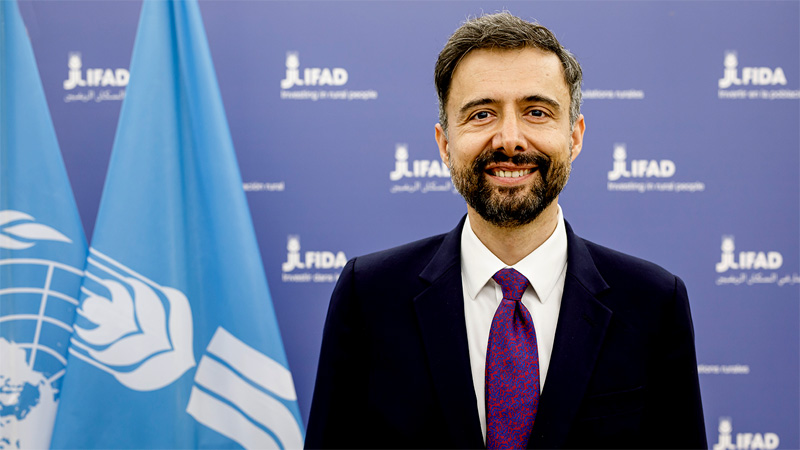Lerato Matheka
The International Fund for Agricultural Development (IFAD) headed into the G7 Agriculture Ministers’ meeting in Syracuse, Italy with a clear mandate that their first line of action against climate change, hunger and poverty is prosperous rural communities.
“Investing in small-scale farmers and rural entrepreneurs is the most effective way to unlock the immense potential of Africa’s agriculture and food systems for all,” said Alvaro Lario, President of the UN’s International Fund for Agricultural Development (IFAD).
The G7 Agriculture Ministers meeting took place in Syracuse on Septtember 26.
With the objection of IFAD announced, Lesotho stands as a testament to the impact of targeted agricultural investments in rural communities.
Lesotho, a small mountainous kingdom, has long been reliant on small-scale farming as a backbone of its rural economy.
In recent years, IFAD has played a pivotal role in helping Lesotho address its agricultural challenges, ranging from food insecurity to the effects of climate change.
IFAD’s investments in Lesotho have not only improved the livelihoods of farmers but also strengthened the country’s resilience to external shocks such as droughts and floods, which have increasingly affected the region due to climate change.
The kicked off with a G7 Agriculture Forum for Africa – an innovation of the G7 Italian presidency – to continue to foster a dialogue between G7 and African nations on the opportunities and challenges in Africa’s agriculture sector.
“In Africa, food insecurity and climate change are damaging opportunities for the millions of young people entering the job market. Developing thriving rural economies that provide good food and decent jobs has a stabilising power. Now is the time to invest at scale in Africa’s small-scale food producers – the backbone of Africa’s food security and development,” President Lario said.
IFAD in a press statement indicated that Small-scale farming supplies up to 70% of the food in Africa and provides livelihood opportunities to hundreds of millions of people, playing a pivotal role in the continent’s food security.
The statement continued noting that food and agriculture are also a vital part of African economies, a sector expected to be worth a trillion dollars by 2030.
“Estimates show that economic growth in agriculture is two to three times more effective at reducing poverty and food insecurity than growth generated in other sectors,” it said.
IFAD’s Impact in Lesotho
Over the years, IFAD has funded several critical projects in Lesotho that aim to support small-scale farmers, promote rural development, and combat hunger. These include:
- The Wool and Mohair Promotion Project (WAMPP): This project, launched in 2015, aimed to improve the livelihoods of smallholder farmers who rely on wool and mohair production. By enhancing the quality of livestock, improving marketing channels, and providing farmers with better access to veterinary services, the project significantly increased incomes for many rural households.
- The Smallholder Agriculture Development Project (SADP): This project focused on strengthening the capacity of smallholder farmers in Lesotho to improve agricultural productivity and diversify their crops. By providing access to improved seeds, tools, and training, SADP has boosted food security and helped farmers adapt to changing climatic conditions.
- The Rural Financial Intermediation Programme (RUFIP): In partnership with IFAD, RUFIP worked to improve access to financial services for rural populations. This initiative empowered farmers to obtain the necessary capital to invest in their farms, purchase new technologies, and grow their businesses.
These projects are part of IFAD’s broader strategy to transform agriculture across Africa by investing in sustainable practices and building rural economies.
President Lario advocated for more investment and in small-scale farmers and policies that prioritise sustainable agriculture practices, support farmers to adapt to climate change and build resilience, stressing that they are the key to food security and rural development.
The Challenges Ahead: Climate Change and Food Security
Lesotho, like many other African nations, faces a critical challenge in adapting to the changing climate. According to IFAD, crop yields in Africa are expected to decrease by up to 25% by the end of the century due to the impact of climate change.
For a country like Lesotho, where many people rely on subsistence farming, this could lead to severe food shortages and increased poverty if left unaddressed.
“Food insecurity and climate change are damaging opportunities for the millions of young people entering the job market,” said President Lario.
In Lesotho, rural youth often migrate to urban areas or neighbouring countries in search of employment, leaving behind an ageing farming population. However, with targeted investments in agriculture, including access to digital technologies, climate-smart farming methods, and financial services, rural areas can become more attractive for young entrepreneurs, IFAD President said.
A Vision for the Future: Digital Technologies and Youth Empowerment
One of the key areas of focus for IFAD at the G7 Agriculture Ministers’ meeting is the role of digital technologies in transforming rural economies.
In Lesotho, access to digital tools could be a game changer, helping farmers receive timely information about weather patterns, market prices, and agricultural advice.
Through projects such as SADP and WAMPP, IFAD has already laid the groundwork for digitisation in Lesotho’s agricultural sector. The introduction of mobile platforms, e-wallets, and financial services is helping farmers access markets, receive pest alerts, and tap into global agricultural knowledge.
With millions of young people entering the job market every year in Africa, President Lario emphasised that digitisation and “green skills” can help attract the youth back to agriculture.
Lesotho’s government and IFAD have already started piloting youth-focused agricultural programs, offering training and support to create small businesses along the food value chain.
Scaling Investment in Lesotho’s Agriculture
Despite the success of past projects, much more needs to be done to secure Lesotho’s agricultural future.
“Now is the time to invest at scale in Africa’s small-scale food producers who are the the backbone of Africa’s food security and development,” the president said and this means increasing investment in infrastructure, water conservation, and technology to help farmers cope with the worsening effects of climate change.
With donor countries’ support to agricultural development stagnant at just 4-6% of total official development assistance over the last decade, and many African countries facing financial constraints, IFAD highlited a need to innovate, and further develop and strengthen de-risking mechanisms to attract investments from the private sector.
“IFAD has committed to investing in rural people in Africa to transform the agriculture sector and promote rural development and in its 2025-2027 project cycle up to 60% of IFAD’s core financing will be invested in the continent,” the organisation said citing that in Africa, 20% of the population is undernourished or suffers from hunger, affecting a total of approximately 300 million people.
Summary
- The kicked off with a G7 Agriculture Forum for Africa – an innovation of the G7 Italian presidency – to continue to foster a dialogue between G7 and African nations on the opportunities and challenges in Africa’s agriculture sector.
- IFAD in a press statement indicated that Small-scale farming supplies up to 70% of the food in Africa and provides livelihood opportunities to hundreds of millions of people, playing a pivotal role in the continent’s food security.
- President Lario advocated for more investment and in small-scale farmers and policies that prioritise sustainable agriculture practices, support farmers to adapt to climate change and build resilience, stressing that they are the key to food security and rural development.

Your Trusted Source for News and Insights in Lesotho!
At Newsday Media, we are passionate about delivering accurate, timely, and engaging news and multimedia content to our diverse audience. Founded with the vision of revolutionizing the media landscape in Lesotho, we have grown into a leading hybrid media company that blends traditional journalism with innovative digital platforms.








